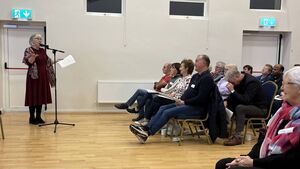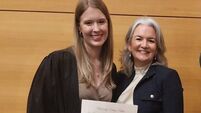Funeral ministers are trained for Mayo and Galway parishes

Mary Connolly, who has a Bachelor of Arts in Liturgical Studies, addressed volunteers as part of their training in funeral ministry. Picture: Fr Stephen Farragher
A training programme in Ballyhaunis this winter will prepare over 40 lay persons to help priests officiate at funerals in the Archdiocese of Tuam, which includes much of counties Mayo and Galway.
“Having discussed the matter at length at diocesan, deanery and parish level, it was decided that training in funeral ministry would be provided for interested parishes in the Claremorris and Dunmore deaneries,” said Fr Stephen Farragher, parish priest based in Ballyhaunis.
“The hope is that this training will, in time, be provided in the other deaneries and parishes in the archdiocese of Tuam,” Fr Farragher explained.
More than 40 volunteers have gathered on Tuesday nights in the Ballyhaunis Community Hall during October and November. They will be confirmed as funeral ministers at the end of the training later this month.
Fr Stephen explained that the training programme has been carefully discussed and prepared and funeral ministry is open to any adult member of the Christian community, “with a sensitive and caring disposition, who has time and the pastoral skills needed to reflect the care of the Christian community".
“For the past two years, the Diocesan Funeral Ministry Resource Team - a working group which included those engaged in funeral ministry from pastoral and professional perspectives - have been engaged in discussion and consultation on how lay people can assist priests with funerals in the parishes of the Archdiocese of Tuam,” said Fr Farragher.
Thus far, the focus has been on the saying of prayers in the funeral home and or in the home of the deceased person, explained Fr Stephen. “These volunteers are being trained to assist priests in helping grieving families to prepare for the funeral of their loved ones."
Monica Morley, from Knock Shrine’s Bereavement Counselling Service and Mary Connolly, who has a B.A. in Liturgical Studies, are helping lay volunteers to prepare to become more involved in carrying out this ministry.
The new ministry is being introduced “so that there will be trained people in our Christian communities, with the necessary skills and awareness, to take up some of these ministries, in a time, when there are fewer priests covering wider areas", explained Fr Farragher.
“With changing circumstances in Church we need to look at how funerals are organised and celebrated. We need to take into account the changing reality of Irish society today, including the ageing population and ever-increasing decline in the number of priests. We must look to the immediate future when lay people will be more centrally involved in carrying out this ministry in parishes.”
Fr Farragher is keen to stress the newly trained ministry will not displace the role of the priest at funerals.
“There are aspects of funeral ministry, especially the sacramental aspect, that can only be carried out by a priest. What is envisaged is that funeral ministers will work alongside the priest, in teams of two, in a supportive context. They will agree areas of responsibility that are feasible for them to take on in a voluntary capacity.”
Funeral ministry has been seen as a ministry reserved to priests only, said Fr Farragher.
“The priest attends those near death, is called to administer the Sacrament of Sick and is on hand at the time of a funeral to offer support to families and to organise and celebrate the different moments of the funeral liturgy.”
The new funeral ministry will preserve a foundational Christian tradition.
“Since the earliest times, the Christian community has prayed for the deceased and accompanied bereaved people by gathering at the time of death," said Fr Farragher. "These rites are acts of public worship at which a number of elements are involved: God is praised; the Resurrection of Jesus is proclaimed reminding us of our hope at being reunited; prayers are offered for the soul of the deceased person, their body is honoured and the bereaved are consoled. Through these sacred practices, space is offered to the bereaved family to express grief and sorrow. They also provide an opportunity to celebrate the life and memory of the deceased person.”





